

Peer to Peer and the Commons: a path towards transition : Céline Piques, Xavier Risos : Free Download & Streaming. Peer to Peer and the Commons: A matter, energy and thermodynamic perspective - Commons Transition. Commons Transition presents this report in two volumes by Céline Piques and Xavier Rizos, with the support of P2P Foundation founder Michel Bauwens.
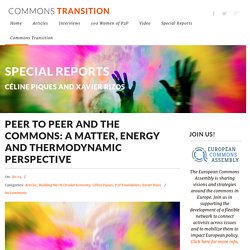
The Commons movement is facing a challenge: to articulate the optimum rate at which a resource can be harvested or used without damaging its ability to replenish itself. The next economy will have to balance the needs of Earth’s expanding population with the shrinking level of resources which are available to everyone. This dynamic equilibrium is called carrying capacity. It is a middle path between the ‘entropic’ faster, geometric growth rates of human population, individual consumption and economic production, and the ‘negentropic’ slower, arithmetic replenishment rates of water, food and fossil fuels.
This means that the carrying capacity rate for renewable resources will have to follow a carefully guided policy of maintenance and sustenance to ensure that resources are replenished sustainably in meeting the needs of people. Life, hierarchy, and the thermodynamic machinery of planet Earth - ScienceDirect. <div pearltreesdevid="PTD135" role="alert" class="alert-message-container"><div pearltreesdevid="PTD136" aria-hidden="true" class="alert-message-body"><span pearltreesdevid="PTD137" style="display: inline-block;" class="Icon IconAlert"><svg pearltreesDevId="PTD138" style="width: 100%; height: 100%;" width="24" height="24" focusable="false" tabindex="-1" fill="currentColor"><path pearltreesDevId="PTD139" fill="#f80" d="M11.84 4.63c-.77.05-1.42.6-1.74 1.27-1.95 3.38-3.9 6.75-5.85 10.13-.48.83-.24 1.99.53 2.56.7.6 1.66.36 2.5.41 3.63 0 7.27.01 10.9-.01 1.13-.07 2.04-1.28 1.76-2.39-.1-.58-.56-1.02-.81-1.55-1.85-3.21-3.69-6.43-5.55-9.64-.42-.52-1.06-.83-1.74-.79z"></path><path pearltreesDevId="PTD140" d="M11 8h2v5h-2zM11 14h2v2h-2z"></path></svg></span><!
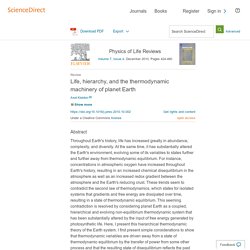
-- react-text: 55 -->JavaScript is disabled on your browser. Please enable JavaScript to use all the features on this page. <! -- /react-text --></div></div> Abstract Research highlights. Peer to Peer and the Commons: A matter, energy and thermodynamic perspective - Commons Transition. Tektology - Wikipedia. Alexander Bogdanov, founder of Tektology Overview[edit] His work Tektology: Universal Organization Science, published in Russia between 1912 and 1917, anticipated many of the ideas that were popularized later by Norbert Wiener in Cybernetics and Ludwig von Bertalanffy in the General Systems Theory.
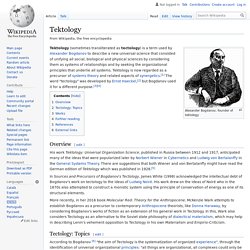
There are suggestions that both Wiener and von Bertalanffy might have read the German edition of Tektology which was published in 1928.[5] In Sources and Precursors of Bogdanov's Tectology, James White (1998) acknowledged the intellectual debt of Bogdanov's work on tectology to the ideas of Ludwig Noiré. Bio — Seona Candy. Seona Candy is a research fellow with the Victorian Eco-innovation Lab at the University of Melbourne with a particular interest in the integration of food and other urban systems, such as waste, water and energy management, to improve the resilience of cities.
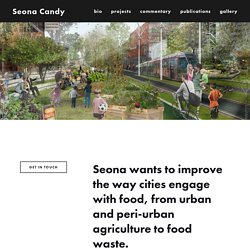
Her recent research work used scenario modelling to link land and resource use with food consumption at a national level on the ARC Linkage project, Australian Food Supply Scenarios, and at a city level with the Foodprint Melbourne Project. Both of these projects looked at all aspects of the food system, from production to distribution and consumption including food waste. She was a co-investigator on the Foodprint Melbourne project. Publications — Seona Candy.
Melbourne's Food Future - planning a resilient city foodbowl, Rachel Carey, Kirsten Larsen, Jennifer Sheridan, Seona Candy, VEIL, released November 2016.
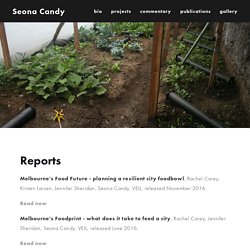
Read now Melbourne's Foodprint - what does it take to feed a city, Rachel Carey, Jennifer Sheridan, Seona Candy, VEIL, released June 2016. AURIN. Australian Urban Research Infrastructure Network. AURIN-Australian Stocks and Flows (ASFF) Data Integration This project will establish two-way data exchange between AURIN and the Australian Stocks and Flows Framework (ASFF), a tool for comprehensive and detailed sustainability analysis.
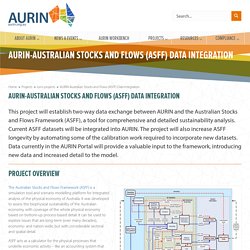
Current ASFF datasets will be integrated into AURIN. The project will also increase ASFF longevity by automating some of the calibration work required to incorporate new datasets. Data currently in the AURIN Portal will provide a valuable input to the framework, introducing new data and increased detail to the model. AURIN. Australian Urban Research Infrastructure Network. DR Seona Candy - The University of Melbourne. Seona is currently working as a research fellow on two projects funded by the CRC for Low Carbon Living.
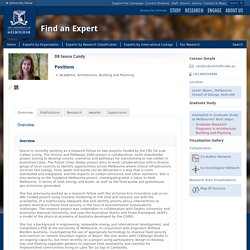
The Visions and Pathways 2040 project is collaborative, multi-stakeholder project aiming to develop visions, scenarios and pathways for transitioning to low-carbon in Australian cities. The Future Cities Nodes project aims to work collaboratively with a diverse group of local councils to identify opportunities across Melbourne where critical infrastructure services like energy, food, water and waste can be delivered in a way that is more distributed and integrated, and the impacts on carbon emissions and urban resilience. She is also working on the Foodprint Melbourne project, investigating what it takes to feed Melbourne, in terms of land, energy and water, as well as the food waste and greenhouse gas emissions generated.
A Commons Transition Plan for the City of Ghent - Commons Transition. By Michel Bauwens (P2P Foundation, research) and Yurek Onzia (project coordination) The context and structure of the report This study was commissioned and financed by the City of Ghent, a city in northern Flanders with nearly 300,000 inhabitants, with the support of its mayor Daniel Termont, the head of the mayor’s staff, the head of the strategy department, and the political coalition of the city which consists of the Flemish Socialist Party SPA, the Flemish Greens (Groen) and the Flemish Liberal Party (Open VLD).
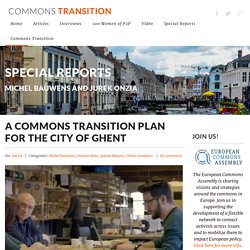
The request was to document the emergence and growth of the commons in the city, to offer some explanations of why this was occurring, and to determine what kind of public policies should support commons-based initiatives, based on consultation with the active citizens in Ghent. The Internet of Ownership – Tools for the platform cooperative ecosystem. Christianisme contre capitalisme de Falk Van Gaver - Les Editions du cerf. Reading Marx's Capital with David Harvey. Why stranded assets matter and should not be dismissed. Whatever the outcome of the climate talks in Paris, one thing is certain: climate change will result in assets becoming “stranded”.
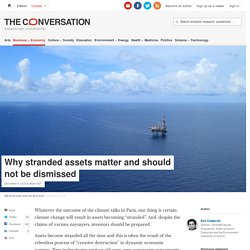
And, despite the claims of various naysayers, investors should be prepared. Assets become stranded all the time and this is often the result of the relentless process of “creative destruction” in dynamic economic systems. New technologies replace old ones, new companies outcompete incumbents, and this constant process changes societies. Think horses and carriages being replaced by trains and automobiles, landlines being superseded by mobile phones, or the problems faced by companies such as Kodak and Nokia.
Physical climate change is already affecting asset values in a wide range of sectors and this is one reason why inflation-adjusted weather-related losses in the insurance sector have been increasing. These risks are only likely to grow in significance. The first is to raise doubts about the idea that there is “unburnable carbon” or a “carbon bubble”. Using Energy to extract energy – the dynamics of depletion. The “Limits to Growth Study” of 1972 was deeply controversial and criticised by many economists.
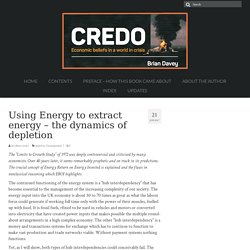
Over 40 years later, it seems remarkably prophetic and on track in its predictions. The crucial concept of Energy Return on Energy Invested is explained and the flaws in neoclassical reasoning which EROI highlights. The continued functioning of the energy system is a “hub interdependency” that has become essential to the management of the increasing complexity of our society.
The energy input into the UK economy is about 50 to 70 times as great as what the labour force could generate if working full time only with the power of their muscles, fuelled up with food. It is fossil fuels, rfined to be used in vehicles and motors or converted into electricity that have created power inputs that makes possible the multiple round- about arrangements in a high complex economy. Yet, as I will show, both types of hub interdependencies could conceivably fail. So what brings about the collapse? La Démocratie au Moyen Âge. En dépit de la vague romantique qui, au XIXe siècle, va entreprendre une réhabilitation partielle et souvent mythique du récit "historique" de cette longue période (un millénaire) que les érudits de la renaissance ont reléguée au rang de "moyen-âge", l'imagerie commune en garde encore des idées complètement fausses : le moyen-âge, pour beaucoup, c'est l'époque où le petit peuple, ignorant et analphabète, est soumis au dictat implacable d'un ordre politique militaire monarchique, et d'un ordre spirituel clérical séculaire et dogmatique ; c'est l'époque des seigneurs, de l'inquisition, des sorcières et des bûchers ; c'est l'époque des guerres incessantes, des croisades sanglantes et de la peste ; en résumé, c'est une époque obscure, sombre, "gothique".
Voici ce que nous en dit Michel FRAGONARD : Doughnut Economics: Seven Ways to Think Like a 21st-Century Economist - Kate Raworth. Energy Slaves comic about Buckminster Fuller - by Stuart McMillen. Cosmolocalization for the anthropocene.mp3. Jose Ramos on Cosmo-Localization for the Anthropocene Transition. LinkedIn. Green Capitalism: The God That Failed. (Image: Jared Rodriguez / Truthout) In what scientists have called "The Great Acceleration," the engine of global capitalist economic development since 1950 has now engulfed nearly the whole world and accelerated at an ever-faster speed, overwhelming our small blue planet's finite natural resources and limited ability to withstand pollution in a last great fire sale of global upper and middle-class overconsumption. Yet the powers that be, governments and their corporate masters, tell us that growth and consumption must grow even faster if we want to keep our jobs, but "not to worry" because their "green jobs," "carbon taxes" and the like will brake the slide to ecological collapse.
This article, originally published January 9, 2014, shows why this patently phony delusion is, nonetheless, so attractive, and why "green capitalism" is a plan for the collapse of civilization and global ecological suicide. Inside the new economic science of capitalism’s slow-burn energy collapse. Even coal, the only fossil fuel resource whose EROI has not yet maxed out, is forecast to undergo an EROI peak sometime between 2020 and 2045. This means that while coal might still have signficant production potential in some parts of the world, rising costs of production are making it increasingly uneconomical. Is Decoupling GDP Growth from Environmental Impact Possible? Abstract The argument that human society can decouple economic growth—defined as growth in Gross Domestic Product (GDP)—from growth in environmental impacts is appealing.
If such decoupling is possible, it means that GDP growth is a sustainable societal goal. Here we show that the decoupling concept can be interpreted using an easily understood model of economic growth and environmental impact. Linking the interests of people together. The Key Idea – Resolution of Zero. Key thoughts Information about economic relationships between people is coded and processed using accounts. Accounts are constructed from two symbols, 1 and 0. The 1s are tallied and the 0s are not. 1 and 0 are defined by the two sides of a distinction, like the opposed sides of a coin, which can be seen exclusively as heads or tails (is up, not down).
Accounting works on the principle of a balance, like the mixing of blue and yellow to give green: Des paysans rachètent un supermarché pour vendre directement leurs produits. Colocations à Paris-20e-arrondissement. « Paris est une fête » disait Ernest Hemingway. Vivre en colocation à Paris est une réelle expérience en soi. Que ce soit en tant qu’étudiant, jeune actif, trentenaire ou senior, Paris est une ville accueillante, lumineuse, fêtarde, et plus que tout magnifique… Paris contient tous les éléments nécessaires pour vivre une bonne colocation : bons restos, boîtes de nuits, parcs, monuments, universités.
Imaginez-vous dans une colocation étudiante près de la Sorbonne et du Panthéon, quartiers riches en histoire, dans un bel appartement parisien. L’histoire de Paris sera là, sous vos pieds, et vous en ferez entièrement parti. Une colocation à Montmartre ou près de Batignole pourrait également vous séduire. Bastille, République ou Oberkampf seront de mise si vous n’avez pas trouvé la perle rare, ou dans les quartiers plus populaires comme Belleville ou Place d’Italie, à proximité du centre. Comprendre les phénomènes d’effondrement de sociétés. Quel avenir pour la nôtre ?
The silver lining of anti-globalism might be the creation of a true digital economy. The Real Circular Economy. L'écologie est-elle possible ? - L'Univers passe. De ces disparitions, l’homme est sans doute l’auteur, mais leurs effets se retournent contre lui. Il n’est aucun, peut-être, des grands drames contemporains qui ne trouve son origine directe ou indirecte dans la difficulté croissante de vivre ensemble, inconsciemment ressentie par une humanité en proie à l’explosion démographique et qui – tels ces vers de farine qui s’empoisonnent à distance dans le sac qui les enferme, bien avant que la nourriture commence à leur manquer – se mettrait à se haïr elle-même, parce qu’une prescience secrète l’avertit qu’elle devient trop nombreuse pour que chacun de ses membres puisse librement jouir de ces bien essentiels que sont l’espace libre, l’eau pure, l’air non pollué.
Why you should read “Ours to Hack and to Own”: the book in 24 powerful insights. The book “Ours to Hack and to Own: the rise of platform cooperativism, a new vision for the future of work and fairer Internet” edited by Trebor Scholz and Nathan Schneider came off the presses a few months ago. It is an impressive collection of forty short and well written pieces that wisely cover forty relevant issues of the promising encounter of Internet platforms and cooperativism. You have to add to this the firsthand testimonial descriptions of twenty-five initiatives based on cooperative platforms, in different fields and stages of development. A World SDG – global accounting of responsibilities for economic impacts. The Natural Step - Wikipedia.
The Natural Step is a non-profit, non-governmental organisation founded in Sweden in 1989 by scientist Karl-Henrik Robèrt and The Natural Step is also used when referring to the partially open source framework it developed. Following publication of the Brundtland Report in 1987, Robèrt developed The Natural Step framework, setting out the system conditions for the sustainability of human activities on Earth; Robèrt's four system conditions are derived from a scientific understanding of universal laws and the aspects of our socio-ecological system, including the laws of gravity, the laws of thermodynamics and a multitude of social studies.
Les AMAP disent NON à la Ruche qui dit oui – Les moutons enragés. Il semblerait que « La ruche qui dit oui » n’est pas une solution aussi idéale que cela, et si des Anonymous (véridique) ont décidé de se mettre en lutte contre cette alternative qui n’avait pas l’air si mal que cela, ils ne sont pas les seuls à s’élever contre cette ruche qui réserverait plus de piqures que de gentilles abeilles inoffensives… Climate Time Machine. What is (Schröger's) Negentropy? Modern Trends in BioThermoKinetics 3, 50-61, 1994 Dr. Mae-Wan Ho Bioelectrodynamics Laboratory Open University, U.K. Abstract. Catastrophe, Creativity and the Renewal of Civilization - P2P Foundation. Hermann Scheer - Wikipedia. Les Grandes phases du système autogestionnaire yougoslave (1/2) La révolution yougoslave et l’autogestion, par Catherine Samary (Le Monde diplomatique, août 2009)
28. Dossier Autogestion : Retour sur « l'autogestion » yougoslave. The 72 most cheering things I learned on my book tour. Paris: Une coopérative de livreurs à vélo pour lutter contre l'uberisation du secteur? Employee or Contractor? · enspiral/services Wiki. This Women Hasn’t Made Any Trash In 2 Years. Here’s What Her Life Is Like… France Just Became the First Country to Ban Plastic Cups, Cutlery, and Plates. À propos d'Imperium, de Frédéric Lordon : Encore un effort pour être internationaliste. Airbnb faces worldwide opposition. It plans a movement to rise up in its defence. Soil as Carbon Storehouse: New Weapon in Climate Fight? by Judith D. Schwartz: Yale Environment 360.
100% Renewable Energy Is Possible, Here's How - EcoWatch. The Anthropocene Marks the Failure of Capitalism, Not Mars-Bound Humanity. Theconversation. Blockchain: how it will transform our economy, society and the internet itself. Why Karl Polanyi Still Matters. Basic income – too basic, not radical enough. Frédéric Lordon, l’intransigeant colérique. October: IEA raises its five-year renewable growth forecast as 2015 marks record year. October: IEA raises its five-year renewable growth forecast as 2015 marks record year. Is Friendship Limited? An Inquiry into Dunbar's Number. (20+) Laurent Fabius : «Cet accord, nous ne pouvons pas le remettre à demain»
Anne Bringault : «Aux États maintenant de fixer dans l’accord de Paris un cap 100% énergies renouvelables !» Surprising Facts About Shortest Paths. Les énergies renouvelables couvriront les besoins français en 2050 selon Stanford. Les énergies renouvelables couvriront les besoins français en 2050 selon Stanford. Combien d'années de pétrole ? Et autres questions sur les stocks de ressources non-renouvelables ~ Energie et développement durable, par Thibault Laconde. Visualizing How Much Energy the Sun Shines Onto Earth: A Thought Experiment.
Empreinte écologique : Comparer la demande et l'offre de ressources régénératives de la biosphère. Biosphere. P2P Foundation Project on the Thermo-Dynamic Efficiences of Commons-Based Peer Production - P2P Foundation.